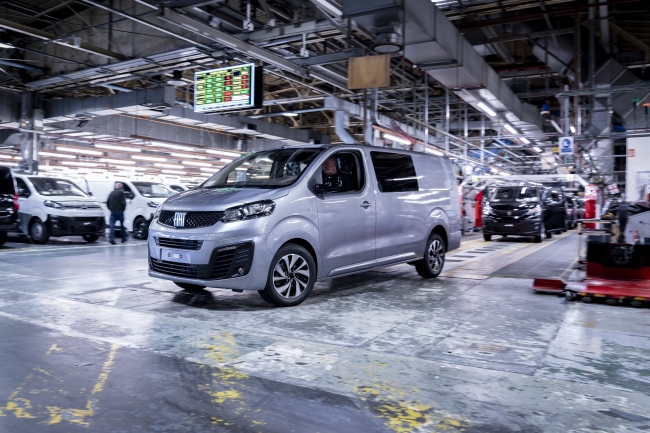2 minute read - 27th February 2023
Commercial vehicle production has best start to year since 2012
UK commercial vehicle (CV) production grew 35.6% in the first month of 2023, with 9,299 vans, trucks, taxis, buses and coaches leaving factory lines, according to figures published by the Society of Motor Manufacturers and Traders (SMMT). January’s strong output marks the best start to a year since 2012, when 9,844 units were produced.
Growth in the month was driven primarily by exports, with 5,326 units produced for international markets. More than half of all British-built CVs (57.3%) set sail for abroad, with the EU, which remains the UK’s biggest overseas customer, responsible for 91.8% of these exports. The domestic market also recorded growth, with output up 36.2% to 3,973 units.

Commercial vehicle production in the UK has enjoyed the best start to a year since 2012, according to January figures from the SMMT / Picture: Stellantis
Volumes are expected to increase significantly throughout the year, notably as new models begin production and a major new electric van manufacturing plant comes on stream – a boost which is set to see UK CV output surpass 160,000 units in 2023.
In comparison, UK car production was stable overall in the first month of 2023, with an output of 68,575 units, according to the SMMT. The ongoing shift to electrified car production continued, with combined battery electric, plug-in hybrid and hybrid electric vehicle volumes up 49.9% to 28,329 units of the overall figure. They represented more than four in every 10 (41.3%) cars made in January, a near record monthly share, and further evidence of the UK’s capability in making these important models, most of which (77.0%) are exported to meet global demand.
Mike Hawes, SMMT chief executive, said: “The UK’s commercial vehicle sector continues to show resilience, surpassing the previous ten years of January output even in the face of global supply shortages and soaring energy costs. To ensure this success continues, we need a framework which secures globally competitive conditions and underpins the delivery of sustainable manufacturing, rapid decarbonisation and economic growth to keep Britain ahead in the race to net zero.”

Graphic & data courtesy of SMMT